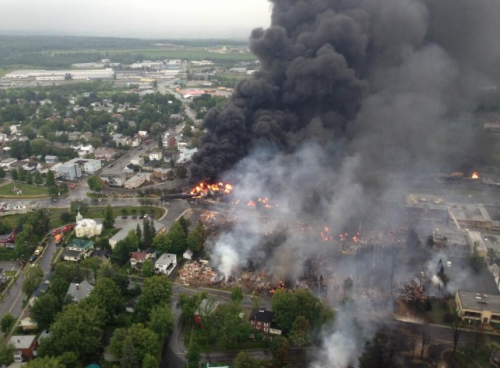News | May 10th, 2019

BAKKEN – Bakken crude is volatile, and tankers hauling the oil have exploded repeatedly claiming at least 47 lives in the past decade. And while the state’s elected few and regulatory commissions refuse to effectively police the transportation of crude oil – evident in the number of explosive accidents involving Bakken crude – the state of Washington recently said they had enough.
With thousands of Bakken crude barrels traversing the country every day, and approximately a dozen explosive derailments since 2008, Washington State Governor Jay Inslee effectively put a halt to the Bakken’s killing spree in their area by signing into law drastic changes to crude transportation guidelines.
But not before a delegation of the North Dakota’s top elected politicians tried to warn Governor Inslee away calling the state’s bill “unscientific.”
In April, senators John Hoeven, Kevin Cramer, and Congressman Kelly Armstrong tried to pressure Inslee to veto the bill that could block Bakken crude – oil mixed with liquid hydrocarbons and dissolved gasses – from entering the Pacific Northwest.
“This legislation would result in a de facto ban of crude-by-rail traffic from North Dakota to refineries throughout the Pacific Northwest and would do little to advance the sponsor’s intended goal of reducing risk along the rail network,” the delegation wrote in the letter to Inslee in April 2019.
“Safety is just as important in North Dakota,” the delegation wrote. “Our state has established appropriate regulations based on the best available sound science and national standards to require companies to remove the most volatile gasses from Bakken crude to meet a certain Reid Vapor Pressure threshold. In fact, North Dakota’s standard is stricter than the required Federal limits.”
After a veiled threat that the Washington Legislature was overstepping its legal boundaries, the delegation’s request failed.
“Beyond the unscientific underpinnings… the bill oversteps its legal boundaries,” the delegation wrote. “The Federal Government maintains field preemption over the State of Washington for the operating practices and movement of hazardous materials by rail through the Federal Railroad Administration.”
Despite the threat, Inslee signed the bill that caps vapor pressure to under nine pounds per square inch on Thursday, May 9. North Dakota’s rule on vapor pressure standards has stood at 13.7 per square inch since December 2014, which is a number slightly less than the national standard of 14.7, according to North Dakota Industrial Commission.
“Bakken oil is uniquely volatile which poses significant threats to people facilities and environment,” Inslee said. “This measure prohibits a facility from unloading or loading or storing crude oil with a vapor pressure greater than nine pounds per square inch. As the federal government continues to fail to exercise its full powers to ensure oil safety, Washington needs to remain vigilant in protecting our communities.”
Approximately 225,000 barrels of Bakken crude are shipped to Washington State per day, according to the North Dakota Petroleum Council.
“With all the trains running through Spokane I am glad they are providing great leadership,” Inslee said of the bill’s sponsors.
Under current state regulations Bakken oil producers dump oil with liquid natural gasses into tankers together, a practice that is apparently commonplace in North Dakota, but not in other oil-producing areas throughout the world. Most companies degasify or separate the oil from the gasses by heat, and then ship the products separately.
Bakken oil is more flammable than other crude oil, according to a 2014 report published by the US Pipeline Hazardous Material Safety Administration. Bakken oil is a “light sweet crude,” of high quality that is easier to refine into commercial products but also easier to ignite.
According to the U.S. Department of Energy, crude oil and liquefied gasses change their properties during transport, which leads to separation producing the flammable liquid that can ignite and has caused explosions taller than 300 feet high.
From Chicago to Louisiana, the Bakken trains travel from western North Dakota through the state to Fargo’s Downtown tracks, next to the Great Northern Bicycle Company on the northern tracks, and banks and restaurants on the southern tracks.
Some trains head east passing close to Minneapolis’s Target Stadium, others head west pass and travel between the Seattle Seahawks and the Mariners stadiums, also under Seattle’s Boardwalk.
Although North Dakota politicians and oil producers believe current regulations are safe enough, the statistics show otherwise, Ron Schalow, an author who has done extensive research on the issue, said.
“At some point people are going to get tired of getting blown up, or living with the possibility of being blown up,” Schalow said. “I’m surprised it’s taken this long.”
In 2014 the government of North Dakota estimated there would be more than 60 deaths if a Bakken oil train were to derail in Fargo or Bismarck, Schalow said.
“The North Dakota Petroleum Council and so-called ND regulators decided not to do things properly in the beginning,” Schalow said. “They decided to simply ship the crude and explosive gases together rather than separate and remove the gases.
“They always complain that there isn’t the infrastructure in place to stabilize the crude in the Bakken. That sounds like a personal problem. So all of the states they run these trains through face the possibility of many deaths because big oil wanted to save money.
“Their money versus the lives of our children. More states will follow suit and refuse Bakken crude on rails. What’s the downside for them?"
Will Block used to work with a tightly knit, well managed group filling tanker cars with crude oil. He left the job three years ago, but still remembers the smell of rotten eggs or sulfide.
“But that’s good because you can smell it,” Block said. He was always concerned about leaks, and the battery life of his detection kit.
“It was a little yellow thing that if it beeped you’d run like hell,” Block said. If he saw coworkers drop, keep running, he was warned not to stop and assist because it would be already too late to help. Run uphill or against the wind.
Block never saw anyone fall, but some coworkers became dizzy.
Regulatory officials were overworked, underpaid, Block said. They tried to do their jobs correctly but at times only cursory checks were performed.
“The people with all regulatory committees that did care… we would have to meet certain inspection goals and sometimes inspectors would show up and we would get a heads up earlier in the day: ‘Remember OSHA. Mind your Ps and Qs. Have all your PPEs ready.’”
PPE means personal protection equipment, Block said.
“They would drive around for 15 minutes and then you'd see them leave,” Block said.
Railroad cars were double, sometimes triple checked, but vapor pressure wasn’t always high on regulatory officials’ lists, he said.
“The people who were checking were doing the best they could,” Block said. “There were only so many regulatory officers through the state, and for them to try their best – they were so understaffed it was laughable.
“There were also huge companies and they talked a sweet game, but at the end they didn’t care about infrastructure, and they got away with what they could and got out.
“It all turned into a logistical nightmare.”
An early sign of Bakken crude’s flammability occurred on August 22, 2008 when 14 cars derailed in Luther, Oklahoma, spilling crude oil and causing a massive explosion. Thirty-five people were evacuated, but no one was hurt.
An early sign of Bakken crude’s flammability occurred on August 22, 2008 when 14 cars derailed in Luther, Oklahoma, spilling crude oil and causing a massive explosion. Thirty-five people were evacuated, but no one was hurt.
In July 2013, 47 people were killed and 40 homes destroyed after a train hauling Bakken crude derailed in Lac Megantic, Quebec. The train’s cargo was listed at 9.33 pounds of pressure per square inch.
November 2013, in Aliceville, Alabama, 25 Bakken crude oil tankers caused an explosive fire in wetlands.
One month later a Bakken crude oil train derailment in Casselton, North Dakota prompted the evacuation of thousands of people living as far as five miles. The train’s crude oil cargo was listed at 10 pounds of pressure per square inch.
January 2014, Philadelphia, a crude oil train derailed leaving six oil tankers dangling from a bridge. That same month another derailment in Plaster Rock, New Brunswick forced residents to evacuate their homes after an explosive fire.
In Lynchburg, Virginia, another train traveling at low speeds carrying Bakken crude oil in April 2014 derailed, and spilled a fireball into the James River.
January 2015, an 11-car train carrying crude oil derails in South Philadelphia creating a HAZMAT situation. Another derailment of Bakken crude traveling through Fayette County, West Virginia in February 2015 forced two nearby towns to evacuate.
Then in May 2015 in Heimdal, North Dakota, the town was evacuated after a crude oil train burst into flames.
The list continues, even as Senator Kevin Cramer insists that after 10 years on North Dakota’s Public Service Commission that Bakken oil was safe, according to a 2014 article published by The Minot Daily.
Now, communities along railroad “blast zones” across the United States are worried they might be next, including Baltimore Maryland, a gateway to East Coast refineries that has more 165,000 residents in potentially affected areas, according to the Chesapeake Climate Action Network.
June 9th 2025
April 30th 2025
April 24th 2025
April 23rd 2025
April 21st 2025



__293px-wide.jpg)

